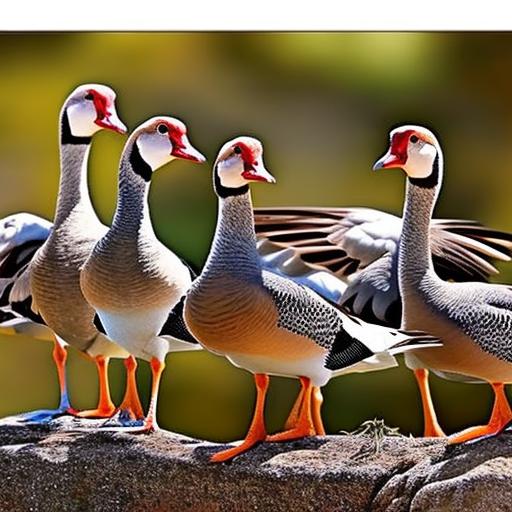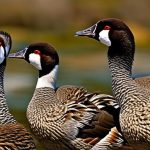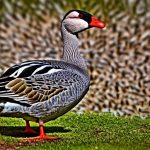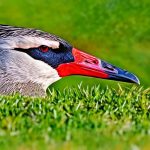Geese farming in Australia has a long history, dating back to the early European settlement. Geese were brought to the country by the first settlers as a source of food and income. Over the years, geese farming has evolved and become more popular among Australians for various reasons.
There are several reasons why people choose to keep geese on their properties. Firstly, geese are excellent pest controllers. They eat insects, snails, slugs, and other pests that can damage crops or gardens. This natural pest control method is not only effective but also environmentally friendly.
Secondly, geese are great producers of fertilizer. Their droppings are rich in nutrients and can be used as organic fertilizer for gardens or crops. This eliminates the need for chemical fertilizers and promotes sustainable farming practices.
Another reason why people keep geese is for meat and egg production. Geese meat is lean and flavorful, making it a popular choice among consumers. Geese eggs are also larger than chicken eggs and have a rich taste. Some people even keep geese for their feathers, which can be used for crafts or pillows.
Lastly, geese can provide entertainment and companionship. They are social animals and can be quite entertaining to watch. Many people enjoy having geese on their properties as pets or as part of a hobby farm.
Key Takeaways
- Keeping geese in Australia is a rewarding and enjoyable experience for many farmers and hobbyists.
- Geese can provide a range of benefits to your property, including pest control, fertilization, and meat and egg production.
- Choosing the right breed of geese for your climate is important to ensure their health and productivity.
- Geese require adequate housing and fencing to protect them from predators and provide them with a comfortable living environment.
- Feeding and watering geese in Australia requires a balanced diet and access to clean water, with additional supplements during breeding and molting seasons.
Benefits of Keeping Geese on Your Property
One of the main benefits of keeping geese on your property is pest control. Geese are natural grazers and will eat a wide variety of pests such as insects, snails, slugs, and even small rodents. This can help reduce the need for chemical pesticides and protect your crops or gardens from damage.
Another benefit is fertilizer production. Geese droppings are high in nitrogen, phosphorus, and potassium, which are essential nutrients for plants. By allowing geese to roam freely on your property, their droppings will naturally fertilize the soil, promoting healthy plant growth and reducing the need for chemical fertilizers.
Geese are also valuable for meat and egg production. Geese meat is lean and flavorful, making it a popular choice among consumers. Geese eggs are larger than chicken eggs and have a rich taste. By raising geese, you can have a sustainable source of meat and eggs for your family or even sell them for profit.
Lastly, keeping geese can provide entertainment and companionship. Geese are social animals and can be quite entertaining to watch. They have unique personalities and can form strong bonds with their owners. Many people enjoy having geese on their properties as pets or as part of a hobby farm.
Choosing the Right Breed of Geese for Your Climate
When choosing a breed of geese for your property in Australia, there are several factors to consider. Firstly, you need to consider the climate in your area. Some breeds are better suited to hot climates, while others are more tolerant of cold weather.
Some popular breeds in Australia include the Embden, Toulouse, Chinese, and African geese. The Embden is a large breed that is known for its white feathers and calm temperament. The Toulouse is also a large breed but has gray feathers and is known for its meat production. The Chinese goose is smaller in size and has a distinctive knob on its beak. The African goose is known for its excellent egg-laying abilities.
When choosing a breed, it’s important to consider their temperament, size, and purpose. Some breeds are more docile and friendly, while others can be more aggressive. Some breeds are better suited for meat production, while others are better for egg production.
It’s also important to consider the climate suitability of different breeds. Some breeds are more tolerant of hot weather, while others can withstand colder temperatures. It’s important to choose a breed that is well-adapted to the climate in your area to ensure their health and well-being.
Housing and Fencing Requirements for Geese
Geese require proper housing and fencing to ensure their safety and well-being. There are several types of housing options for geese, including sheds, coops, or simple shelters. The housing should provide protection from the elements, predators, and have enough space for the geese to move around comfortably.
Geese also require a secure fencing system to prevent them from wandering off or being attacked by predators. The fencing should be at least 4 feet high and made of sturdy materials such as wire mesh or electric fencing. It’s important to regularly inspect the fencing for any damage or weak spots to ensure the geese are safe and secure.
To keep geese safe from predators, it’s important to take additional measures such as installing motion-activated lights or using guard animals such as dogs or llamas. Geese are vulnerable to predators such as foxes, raccoons, or birds of prey, so it’s important to be proactive in protecting them.
Feeding and Watering Geese in Australia
Geese have specific nutritional requirements that need to be met for their health and well-being. They require a balanced diet that includes grains, greens, and protein sources. Commercial goose feed is available in Australia and can be supplemented with fresh vegetables, fruits, or grass.
It’s important to provide geese with access to fresh water at all times. Geese require water for drinking, bathing, and digestion. A shallow pool or pond can be provided for them to swim and bathe in, which is not only enjoyable for the geese but also helps keep them clean and healthy.
It’s important to monitor the feeding and watering of geese to ensure they are getting the right amount of nutrients. Overfeeding can lead to obesity and health problems, while underfeeding can result in malnutrition. It’s important to provide a balanced diet and adjust the feeding amounts based on the age, size, and activity level of the geese.
Health and Veterinary Care for Geese
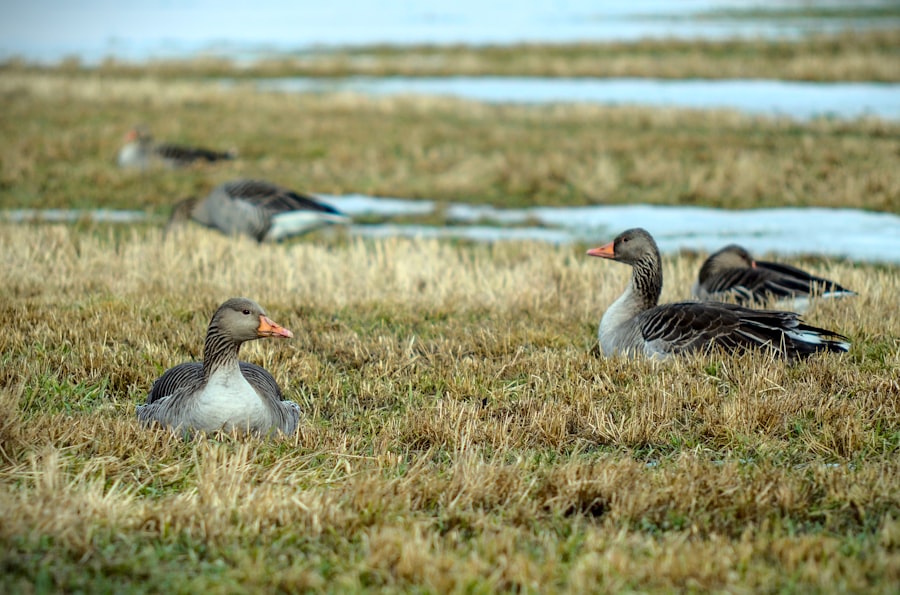
Geese are generally hardy birds but can still be susceptible to certain health issues. Common health issues in geese include respiratory infections, parasites, and foot problems. It’s important to monitor the health of your geese regularly and take preventative measures to keep them healthy.
Preventative measures include providing a clean and dry living environment, regular cleaning of water and feeding containers, and regular deworming. It’s also important to provide a balanced diet and ensure the geese have access to fresh water at all times.
If you notice any signs of illness or abnormal behavior in your geese, it’s important to consult a veterinarian who specializes in poultry or avian medicine. They can provide a proper diagnosis and recommend appropriate treatment options.
Breeding and Hatching Geese Eggs
Breeding season for geese typically occurs in the spring or early summer. During this time, geese will mate and lay eggs. The incubation period for goose eggs is around 28-35 days, depending on the breed.
To successfully hatch goose eggs, it’s important to provide a suitable nesting area for the geese. This can be a simple nest made of straw or hay in a quiet and secluded area. The nest should be protected from predators and have enough space for the goose to sit comfortably.
During the incubation period, it’s important to monitor the temperature and humidity levels in the nesting area. The temperature should be around 99-101 degrees Fahrenheit, and the humidity should be around 50-55%. It’s also important to turn the eggs regularly to ensure proper development.
Once the eggs hatch, it’s important to provide a warm and safe environment for the goslings. They should be kept in a brooder with a heat lamp and provided with fresh water and food. It’s important to monitor their health and provide any necessary veterinary care.
Managing Geese in a Mixed Farming Environment
Integrating geese into a mixed farming system can have several benefits. Geese can help control pests, provide fertilizer, and even help manage weeds. However, there are also challenges that need to be addressed to ensure successful integration.
One challenge is managing the grazing habits of geese. Geese are natural grazers and can eat a significant amount of grass or crops if not properly managed. It’s important to rotate their grazing areas and provide alternative food sources to prevent overgrazing.
Another challenge is managing the interaction between geese and other livestock or crops. Geese can be territorial and may attack other animals or damage crops if not properly managed. It’s important to provide separate areas for different animals and implement proper fencing to prevent conflicts.
To successfully integrate geese into a mixed farming system, it’s important to have a well-thought-out plan and consider the specific needs and requirements of each species. It’s also important to monitor the interactions between different animals and make adjustments as needed.
Legal Requirements for Keeping Geese in Australia
In Australia, there are certain legal requirements for keeping geese. Depending on the state or territory, permits or licenses may be required for keeping geese on your property. It’s important to check with your local government or agricultural department to ensure compliance with the regulations.
There may also be regulations on breeding and selling geese. Some states or territories may require breeders to be registered or have specific certifications. It’s important to familiarize yourself with the regulations in your area to avoid any penalties or legal issues.
Penalties for non-compliance with the regulations can vary depending on the severity of the offense. It’s important to take the necessary steps to ensure compliance and maintain the health and welfare of your geese.
Tips for Successful Geese Farming in Australia
To ensure successful geese farming in Australia, there are several best practices to follow. Firstly, it’s important to choose the right breed of geese for your climate and purpose. Consider their temperament, size, and suitability for your specific needs.
Secondly, provide proper housing and fencing to ensure the safety and well-being of your geese. Regularly inspect the housing and fencing for any damage or weak spots and take measures to protect them from predators.
Thirdly, provide a balanced diet and access to fresh water at all times. Monitor the feeding and watering of your geese to ensure they are getting the right amount of nutrients.
Lastly, monitor the health of your geese regularly and take preventative measures to keep them healthy. Consult a veterinarian who specializes in poultry or avian medicine if you notice any signs of illness or abnormal behavior.
In conclusion, keeping geese on your property in Australia can have several benefits, including pest control, fertilizer production, meat and egg production, and entertainment. By choosing the right breed, providing proper housing and fencing, feeding and watering them correctly, monitoring their health, and following legal requirements, you can have a successful geese farming operation in Australia.
If you’re interested in keeping geese in Australia, you may also want to learn about the mating season for other poultry birds. Poultry Wizard has a helpful article on when guinea fowl lay eggs, which can provide valuable insights into breeding and caring for these unique birds. Additionally, they have an informative piece on the mating season for turkeys, offering guidance on how to successfully breed and raise turkeys. Lastly, if you’re considering adding ducks to your flock, Poultry Wizard’s article on when duck mating season occurs can be a great resource. Explore these articles to expand your knowledge and enhance your poultry-keeping experience.
FAQs
What are the regulations for keeping geese in Australia?
In Australia, regulations for keeping geese vary by state and territory. It is important to check with your local government authority for specific regulations in your area.
What are the benefits of keeping geese?
Geese can be great for pest control, as they eat insects and weeds. They also produce eggs and meat, and can be used for feather production. Additionally, geese can be great for landscaping, as they can help maintain grass and other vegetation.
What do geese eat?
Geese are herbivores and primarily eat grass, weeds, and other vegetation. They may also eat insects and small animals.
What kind of housing do geese need?
Geese need a secure and dry shelter to protect them from predators and the elements. They also need access to water for swimming and drinking.
How do I care for geese?
Geese require regular feeding and access to clean water. They also need regular grooming and veterinary care. It is important to provide them with a safe and comfortable environment.
Can geese be kept with other animals?
Geese can be kept with other animals, but it is important to ensure that they are compatible and that the other animals do not pose a threat to the geese. It is also important to provide enough space for all animals to live comfortably.
Meet Walter, the feathered-friend fanatic of Florida! Nestled in the sunshine state, Walter struts through life with his feathered companions, clucking his way to happiness. With a coop that’s fancier than a five-star hotel, he’s the Don Juan of the chicken world. When he’s not teaching his hens to do the cha-cha, you’ll find him in a heated debate with his prized rooster, Sir Clucks-a-Lot. Walter’s poultry passion is no yolk; he’s the sunny-side-up guy you never knew you needed in your flock of friends!

